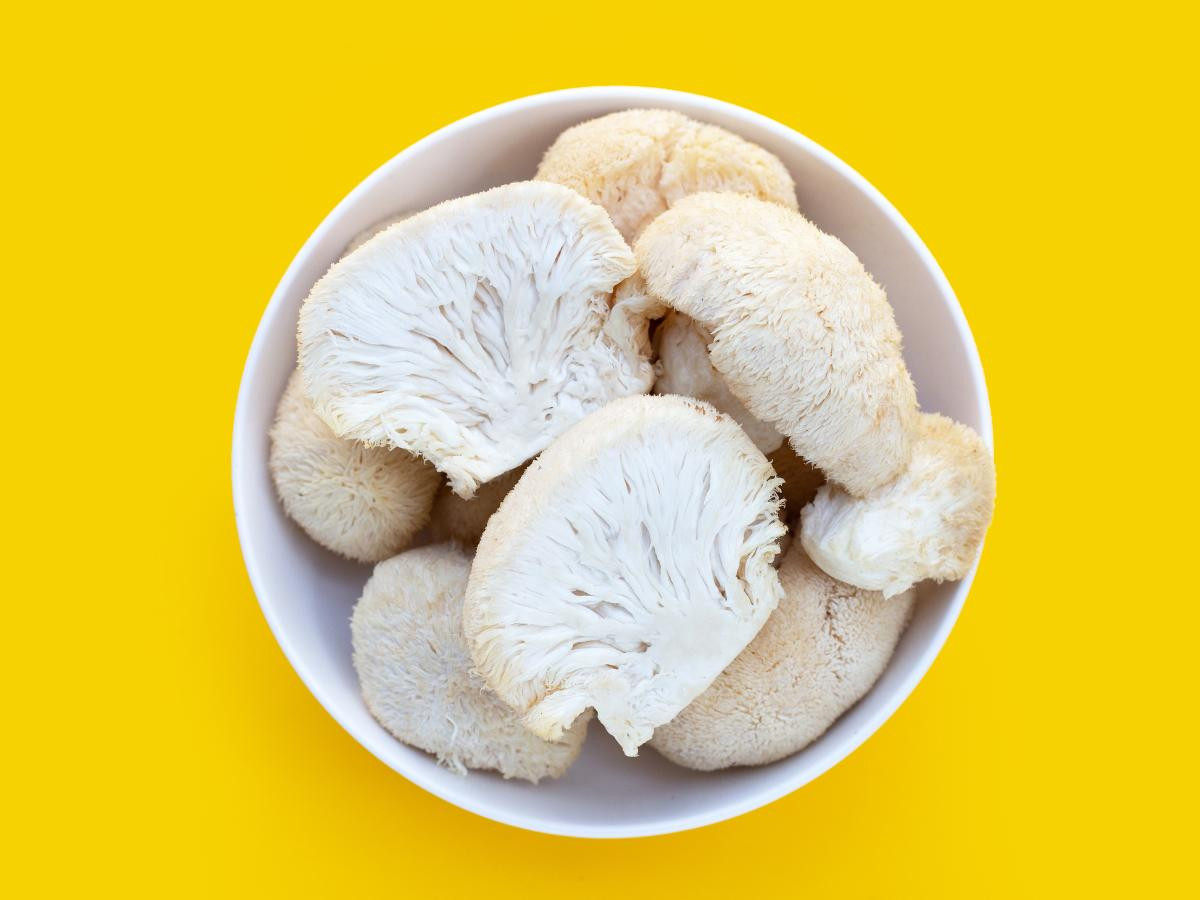Taking Lion’s Mane Mushrooms Before Bed: A Complete Guide To Smart Sleep
Lion’s Mane Mushroom is Known for keeping you awake and alert during the day, but is it wise to take it before bed at night? As we dive into the science and stories behind Lion’s Mane, you’ll discover how this humble mushroom could be the missing ingredient for a more restful night’s sleep and heightened cognitive performance.

The Lion’s Mane Mushroom: A Secret For Restful Nights or Restless Nightmares
As an executive chef with over 30 years of experience and a firm believer in the power of medicinal mushrooms, I’m thrilled to share my insights on a nightly ritual that has truly enhanced my life—incorporating Lion’s Mane Mushrooms before bedtime.
Lion’s Mane, with its regal appearance and nutritional prowess, has been a well-kept secret in the culinary world, and its potential benefits before bedtime have sparked a culinary revolution of sorts.
We’ll peel back the layers of Lion’s Mane’s cognitive benefits, exploring its role in memory enhancement and focus amplification. But that’s not all – our journey doesn’t end there.
We’ll venture into the world of sleep quality and examine how Lion’s Mane before bed might just be the calming touch your evenings need. Lion’s Mane Mushroom Extract, Homemade Mushroom Powders or even a bowl of Lion’s Mane Risotto a few hours before bed could be the answer to kicking the sleeping pills jam packed with chemical and getting a true natural deep sleep from mother nature.
However, just like crafting the perfect dish, we must be aware of the ingredients we’re working with. We’ll highlight the potential risks and considerations as we unfold the benefits. It’s a holistic approach, ensuring the information served is delicious and tailored to your unique palate and health needs.
We’ll weigh the potential benefits, stir in a dash of science, sprinkle anecdotes for brain fog, and, most importantly, help you determine if incorporating Lion’s Mane before bed aligns with your recipe for sound sleep and well-being.
This isn’t just about mushrooms; it’s about enhancing both your cognitive prowess and the quality of your shut-eye.
Table of Contents
Understanding The Lion’s Mane Mushroom

Now that we’ve established the groundwork for exploring the utilization of Lion’s Mane before bed let’s delve into a more detailed examination of the potential health benefits and considerations.
We aim to provide a comprehensive understanding, enabling you to decide whether incorporating Lion’s Mane into your nighttime routine aligns with your wellness objectives.
1. Cognitive Enhancement

Lion’s Mane, a remarkable ingredient in the culinary and wellness arenas, offers cognitive benefits beyond its delectable taste. Scientifically speaking, the presence of hericenones and erinacines in Lion’s Mane is likely to stimulate nerve growth factors, potentially resulting in improved memory, heightened focus, and an overall enhancement in cognitive function. This metaphorical symphony within central nervous system of the brain creates a conducive environment for optimal mental performance.
Lion’s Mane (Hericium erinaceus) is a medicinal mushroom renowned for its potential cognitive enhancement properties, primarily attributed to specific bioactive compounds found in the mushroom. Here’s a breakdown of how Lion’s Mane works to enhance cognitive function:

Stimulation of Nerve Growth Factor (NGF):
Lion’s Mane contains hericenones and erinacines, which are believed to stimulate the production of Nerve Growth Factor (NGF).
NGF is a protein that plays a crucial role in nerve cell maintenance, survival, and regeneration, particularly in the brain. It promotes the growth, development, and function of neurons.
Neurogenesis and Synaptogenesis:
NGF, induced by Lion’s Mane, may contribute to neurogenesis, the formation of new neurons, and synaptogenesis, the formation of synapses (connections) between neurons.
This process is fundamental for learning, memory, and overall cognitive function, enhancing communication between brain cells.
Protection Against Neurological Diseases:
Lion’s Mane has shown neuroprotective properties, potentially guarding against neurodegenerative diseases like Alzheimer’s and Parkinson’s.
Promoting NGF and other antioxidant effects may help protect the brain from damage caused by oxidative stress and inflammation.
Enhanced Brain Plasticity:
Brain plasticity, or neuroplasticity, refers to the brain’s ability to reorganize and adapt by forming new neural connections throughout life.
Lion’s Mane may contribute to enhanced brain plasticity by supporting NGF production, allowing for improved adaptability and learning capabilities.
Improved Myelination:
Myelin is a fatty substance that forms a protective layer around nerve fibers, ensuring efficient transmission of electrical signals in the brain.
Lion’s Mane has been suggested to promote myelination, potentially leading to faster and more efficient neural communication.
Reduction of Oxidative Stress:
Lion’s Mane exhibits antioxidant properties, helping to neutralize free radicals in the brain.
By reducing oxidative stress, Lion’s Mane may protect neurons from damage and contribute to overall brain health.
2. Lion’s Mane and Sleep Quality

As the day concludes, taking Lion’s Mane promotes improved sleep quality. Its potential to interact with the nervous system positions it as a prospective ally in cultivating a serene prelude to a restful night’s sleep.
Think of it as a harmonious prelude rem sleep, creating an environment conducive to deep and undisturbed slumber.
The potential connection between Lion’s Mane mushrooms and improved sleep quality is an intriguing aspect that has garnered attention in recent research on sleep disorders.
While the precise mechanisms are not fully understood, there are several ways in which Lion’s Mane may contribute to better sleep:

Stress Reduction:
Lion’s Mane has been suggested to have adaptogenic properties, which may help the body adapt to stress and maintain balance.
By reducing stress levels, Lion’s Mane could create a more relaxed mental state conducive to falling asleep and experiencing restful sleep.
Nervous System Regulation:
Compounds in Lion’s Mane may have a regulatory effect on the nervous system, potentially calming the mind and promoting relaxation.
This nervous system modulation could contribute to a smoother transition from wakefulness to sleep.
Melatonin Production:
Some research indicates that Lion’s Mane may influence melatonin production, a hormone that regulates the sleep-wake cycle.
A balanced and well-regulated melatonin release is crucial for initiating and maintaining sleep, and Lion’s Mane may play a role in supporting this process.
Anti-Inflammatory Effects:
Inflammation in the body, including the brain, can interfere with sleep patterns.
Lion’s Mane’s anti-inflammatory properties may contribute to a reduction in inflammation, potentially positively impacting sleep.
Improved Neurotransmitter Balance:
Lion’s Mane has been linked to the regulation of neurotransmitters, such as serotonin and dopamine, which play key roles in mood and relaxation.
Balanced neurotransmitter levels can create a conducive calm and peaceful sleep environment.
Enhanced Cognitive Function:
Lion’s Mane’s potential cognitive benefits may contribute to better sleep quality. Improved cognitive function can reduce stress and anxiety, promoting a more serene mental state for sleep.
Reduced Anxiety and Depression:
Some studies suggest that Lion’s Mane may have anxiolytic (anxiety-reducing) and antidepressant effects.
Addressing anxiety and depression can positively impact sleep quality by alleviating factors that might interfere with restful sleep.
3. Melatonin Harmony

Consider Lion’s Mane as the conductor orchestrating melatonin, the hormone responsible for regulating sleep-wake cycles.
The potential influence on melatonin production positions Lion’s Mane as an intriguing component in fostering a natural and harmonious synchronization with your body’s circadian rhythm.
Lion’s Mane mushrooms have shown potential in influencing melatonin, a hormone critical for regulating the sleep-wake cycle.
While the exact mechanisms are still being explored, here are some ways in which Lion’s Mane may contribute to melatonin production and, consequently, support better sleep:
Indirect Influence on the Pineal Gland:
The pineal gland is a small, pinecone-shaped gland in the brain responsible for melatonin synthesis and release.
Compounds found in Lion’s Mane may indirectly influence the pineal gland, prompting it to produce and release melatonin. This interaction may help regulate the body’s natural circadian rhythm.
Antioxidant Properties:
Lion’s Mane possesses antioxidant properties, which may reduce oxidative stress in the body, including the brain.
By mitigating oxidative stress, Lion’s Mane may create a more favorable environment for the pineal gland to function optimally and produce melatonin.
Neuroprotective Effects:
The neuroprotective properties of Lion’s Mane may play a role in supporting the overall health and function of the brain, including the pineal gland.
A well-functioning and protected pineal gland is more likely to release melatonin in a regulated and balanced manner.
Balancing Neurotransmitters:
Lion’s Mane has been associated with regulating neurotransmitters, including serotonin.
Serotonin is a precursor to melatonin, and a balanced serotonin level may contribute to melatonin synthesis, supporting the natural sleep-wake cycle.
Stress Reduction:
Chronic stress and elevated cortisol levels can disrupt the production of melatonin.
Lion’s Mane’s adaptogenic properties may help mitigate stress, indirectly contributing to a more stable environment for melatonin synthesis.
Potential Interaction with Gut Microbiota:
Emerging research suggests a link between gut health and melatonin production. Lion’s Mane may influence gut microbiota positively.
A balanced gut microbiome can contribute to overall well-being, indirectly influencing melatonin production.
4. Integrating Lion’s Mane Before Bed

The options are diverse and adaptable when incorporating Lion’s Mane before bed.
Whether through a meticulously prepared Lion’s Mane tea or seamlessly integrating it into a bedtime snack, the goal is to cultivate a personalized and effective wellness ritual that aligns with your lifestyle.
Integrating Lion’s Mane into your sleep cycle and bedtime routine can be a delightful and beneficial experience. Here are some creative and practical ways to make Lion’s Mane a part of your evening ritual:
Lion’s Mane Tea:
Brew a calming cup of Lion’s Mane tea as part of your nightly wind-down routine. You can find Lion’s Mane tea bags or use Lion’s Mane mushroom extract or powder to make your infusion. Steep the tea briefly and enjoy the incredible benefits and delcious earthy, soothing flavor.
Golden Milk with Lion’s Mane:
Combine the anti-inflammatory properties of turmeric with the cognitive benefits of Lion’s Mane by making a golden milk latte. Heat your milk of choice, and add Lion’s Mane extract or powder, turmeric, and honey for sweetness. It’s a cozy and nutritious bedtime beverage.
Lion’s Mane Elixir:
Create a personalized elixir by blending Lion’s Mane mushroom extract or powder with warm water, a splash of coconut milk, and a hint of cinnamon or nutmeg for added flavor. This simple concoction can be sipped slowly, signaling your body that it’s time to unwind for a good night’s sleep.
Bedtime Smoothie:
Incorporate Lion’s Mane into a bedtime smoothie by blending it with ingredients like banana, almond milk, and a scoop of nut butter. The natural sweetness of the fruits complements the earthy tones of Lion’s Mane.
Lion’s Mane Capsules or Tinctures:
If you prefer a more straightforward approach, consider taking Lion’s Mane in capsule or tincture form. This eliminates the need for preparation, offering a convenient and quick way to include Lion’s Mane in your nightly routine.
Bedtime Snack with Lion’s Mane:
Incorporate Lion’s Mane mushroom into a light bedtime snack. Mix Lion’s Mane extract or powder into yogurt, sprinkle it over a bowl of berries, or add it to a small serving of nuts. This provides a nutritious boost of health benefits without being too heavy before bedtime.
Lion’s Mane Chocolate Treats:
Get creative in the kitchen by making your own Lion’s Mane-infused chocolate. Melt dark chocolate, stir in Lion’s Mane extract or powder, and pour into molds. Not only does it taste indulgent, but it also provides the cognitive benefits of Lion’s Mane mushroom.
5. Potential Risks and Considerations

Just as any seasoned chef exercises caution when introducing new ingredients, it is imperative to approach the integration of Lion’s Mane before bed with a discerning mindset. A consultation with your healthcare professional becomes essential, ensuring that this addition is harmonious with your health profile.
While taking a Lion’s Mane is generally considered safe for most people, there are some potential risks and considerations, especially when incorporating lion’s mane before bed.
Individual Sensitivity:
Individuals may respond differently to supplements; taking Lion’s Mane is no exception. Some people may be more sensitive to its effects, while others may not notice significant changes.
Allergies:
Individuals with known mushroom allergies should exercise caution when you take Lion’s Mane. Although Lion’s Mane differs from common allergenic mushrooms, cross-reactivity can lead to allergic reactions.
Digestive Sensitivity:
Some people may experience digestive discomfort when you take Lion’s Mane, such as mild gastrointestinal upset or bloating. Starting with a lower dosage and gradually increasing it can help mitigate potential digestive issues.
Interaction with Medications:
Lion’s Mane may interact with certain medications, particularly those affecting blood clotting. If you are taking anticoagulant or antiplatelet medications, or if you have a bleeding disorder, consult with your healthcare professional before taking Lion’s Mane.
Potential Sleep Disturbance:
While many individuals report that Lion’s Mane promotes relaxation and better sleep, some may experience heightened alertness or vivid dreams when trying to fall asleep. If you notice any sleep disturbances, consider adjusting the timing of your Lion’s Mane consumption.
Pregnancy and Breastfeeding:
There is limited research on the safety of Lion’s Mane during pregnancy and breastfeeding. To err on the side of caution, pregnant or breastfeeding individuals should consult with a healthcare professional before using Lion’s Mane.
Quality of the Supplement:
Ensure you are using high-quality Lion’s Mane mushroom supplements. Look for third-party products tested for purity and potency of Lion’s Mane Supplements. Poor-quality supplements may not provide the desired effects and could potentially contain contaminants.
Consultation with a Healthcare Professional:
Before taking Lion’s Mane extracts, powders, or any supplement into your routine, it’s advisable to consult with a healthcare professional, especially if you have pre-existing health conditions, are taking medications, or are unsure about potential interactions.
Tipping My Cap

Lion’s Mane’s cognitive symphony, led by hericenones and erinacines, is like crafting a brain-boosting masterpiece.
Think improved memory, heightened focus, and an overall cognitive upgrade – a sensory experience as satisfying as a well-spiced dish.
Regarding sleep, the traditional Chinese medicine of Lion’s Mane takes center stage as a calming prelude.
It might interact with the nervous system, tweak melatonin production, and ease stress, creating an environment perfect for deep, rejuvenating sleep.
But, like any good recipe, a dash of consideration is key.
Be mindful of mushroom extracts and lion’s mane supplements individual sensitivities, and allergies, and consult with a healthcare professional.
So, whether you’re sipping, snacking, or experimenting with Lion’s Mane, let it be a conscious choice – a flavorful journey towards cognitive elevation and more restful sleep at night.







